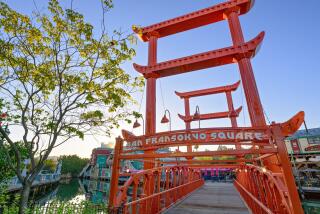Six Flags gives a preview of what it’ll be like when theme parks reopen
Six Flags Entertainment Corp. became the first major U.S. theme park company to release a set of safety protocols for the reopening of all its U.S. parks, saying it will limit the number of people allowed in, check guests’ temperatures and require everyone to wear masks and spread out in lines and on rides.
The new protocols offer a preview of how theme park fans are likely to experience U.S. parks in the COVID-19 era.
“It’s a new wave,” said Dennis Speigel, president of the consulting firm International Theme Park Services. “That is the way we are going to live in the future.”
On Wednesday, Walt Disney Co. is expected to tell a government task force in Florida when its Florida theme parks will open, though the Disneyland resort in Anaheim is not expected to be discussed. No protocols for Disney’s U.S. parks have been disclosed.
Universal Orlando Resort released protocols to open its three parks in Florida starting June 5 but not Universal Studios Hollywood in Los Angeles. “We will be focused on aggressive protocols around spacing, screening and sanitation,” said Thomas Schroder, a spokesman for Universal Orlando.
Cedar Fair Entertainment Co., which owns Knott’s Berry Farm in Buena Park, has yet to release details of protocols for its U.S. theme parks.
Industry experts predict most theme park companies will adopt measures similar to those outlined by Six Flags, including the requirements that guests wear masks and not cram together in queues or on rides.
How soon the parks open will be decided by the governor and local lawmakers in each park’s state. In California, a state Health and Human Services spokesperson said Tuesday that theme parks could be allowed to open late in the third phase of Gov. Gavin Newsom’s four-phase reopening plan.
Six Flags, which operates Six Flags Magic Mountain in Valencia and 25 other parks in the U.S., Mexico and Canada, plans to debut its new protocols when it opens Frontier City in Oklahoma City on June 5.
For the first two days, the Oklahoma park will open only to monthly membership and season-pass holders. Afterward the attendance limit will be increased gradually throughout the month, with capacity limits imposed by state officials.
The protocols for Six Flags parks include:
— Employees and guests will be required to wear masks. If guests don’t bring masks, they will be asked to buy them at the front gate. Guests can remove masks while eating or drinking.
— Guests must make reservations so the park can limit attendance.
— Rather than physically searching guests’ bags, the park will use new no-touch screening devices at the gates.
— Thermal imaging cameras will take the temperatures of guests before they enter the park.
— Guests will be separated by empty rows or seats on rides to maintain some distance between riders.
— Markers on the ground will encourage visitors to maintain distancing in lines for rides and restaurants.
— Rides, restraints, rails, tables, doors, trash cans and other “high-touch points” will be cleaned frequently.
“This new normal will be very different, but we believe these additional measures are appropriate in the current environment,” Six Flags President and Chief Executive Mike Spanos said in a statement Tuesday.
Six Flags officials said they expect the protocols to exceed state and local officials’ safety requirements and are willing to adjust if necessary.
Dr. Dean Winslow, an infectious disease specialist and professor at Stanford University, said the risk of infection is lower in outdoor theme parks than in crowded enclosed spaces because the open air can dilute the particles that people emit when they talk or cough. But he added that it is still important for guests at theme parks to wear masks and maintain distance on rides, in queues and when eating.
“It sounds like with this particular set of operational instructions they have done their homework,” he said about the Six Flags protocols that were described to him.
In its earnings report for the first three months of the year, Six Flags Entertainment announced a $26-million drop in revenue, or 20% compared with the same period last year, primarily because of the closure of its parks on March 13. Before the parks were closed, attendance had jumped 19% from the year-earlier period, it said.
Shanghai Disneyland in China reopened May 11 with an attendance limit of 30% of its 80,000-visitor capacity per day. Reservations had to be made online a week in advance, and visitors were allowed only if a government-backed tracking app on their phones indicated they hadn’t been near people suspected of having the virus. Employees and guests must wear masks.
This month, Disney’s chief medical officer, Dr. Pamela Hymel, issued an online message saying Disney is evaluating safety measures for reopening the company’s U.S. parks, including extra cleaning, distancing between park visitors and the use of masks.
Most U.S. theme parks have been closed since mid-March and have laid off or furloughed thousands of employees. Although Six Flags’ reopening protocols lay the road map for eventually returning to normal operations, industry experts say the capacity limits and cost of the extra health measures will mean theme parks will continue to lose money for a while.
Reopening is “a question of losing less money than they are losing now,” said Martin Lewison, a business administration professor and theme park expert from Farmingdale State College in New York.
Some Americans have shown frustration with the health safety rules brought on by the pandemic, and Lewison said he expects some park guests will rebel against theme parks’ distancing and mask requirements.
“I think there will be a little tension,” he said. “It seems to me a lot of the public is ready to cast off any sort of restrictions.”
Speigel, the consulting firm president, noted that at the top of the web pages where Universal Orlando Resorts announced its plans to reopen, a message warns potential guests that exposure to the virus is inherent in any public place and “we cannot guarantee you will not be exposed during your visit.”
The biggest concern among theme park operators, he said, is that the parks will face legal liability if the number of coronavirus cases jumps after they reopen.
“This is what is scaring everybody,” he said. “What if we reopen and get a relapse?”
Speigel said it is unclear whether theme parks can be protected from liability by posting such warnings.







